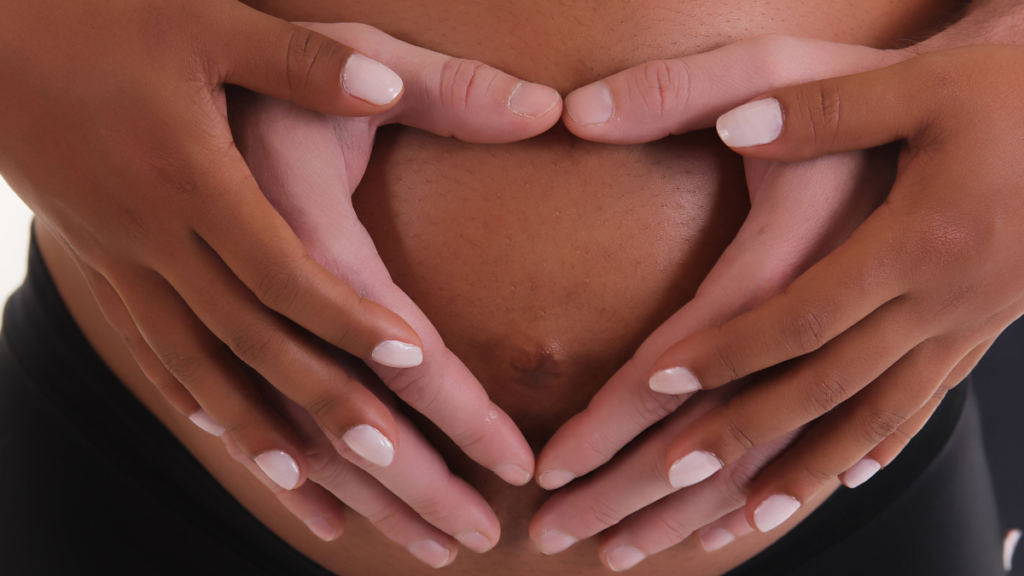
As you reach the nine-week stage, your pregnancy is probably starting to feel a little more real. Your body is continuing to change, and you may start to notice a few more physical differences. Many women start to see their waist thickening and a small bump beginning to develop.
Your baby is also rapidly growing and developing. Read on to find out more about all the early pregnancy symptoms and changes to your body and baby at nine weeks pregnant.
By this stage, the fetus is around 22mm long, meaning your baby is about the size of a small strawberry, or a cherry.
All of you baby’s major organs are now developing and bones are forming. As well as hands and feet developing, your baby’s face is also starting to take a more recognizable shape. Eyelids will have formed to protect their eyes and a teeny tiny tongue – with tastebuds – is forming.
It’s an important stage for the development of your baby’s eyes. They’re growing bigger and starting to develop a distinct colour. However, this often changes after birth. It can even take up to three years for your child’s true eye colour to come through.
At nine weeks you are still in your first trimester and likely to experience some early pregnancy symptoms. Every woman’s pregnancy is different but here’s a recap of some of the common symptoms at this stage.
Morning sickness is one of the most common pregnancy symptoms, although not everyone will suffer from it in their first trimester. Unfortunately for some women, the nine-week mark can be when nausea and vomiting are most intense.
Breast tenderness is another common symptom at this stage as the pregnancy hormone levels in your body continue to change.
As your uterus continues to expand, it can press on your bladder and result in what feels like endless trips to the toilet. The increased blood flow to your kidneys means you’ll produce more up to 25% more urine, too.
You may notice that you become much more sensitive to certain smells during the first trimester of your pregnancy. This, along with nausea, is a pretty hellish combination for some women during the first couple of months of pregnancy. Thankfully, symptoms tend to wear off as you progress through your second trimester.
Around this stage of your pregnancy some early pregnancy cravings might start to kick in and you could find yourself hankering for gherkins and lemon slices.
The changing hormone levels can also lead to experiencing a strange, metallic taste in your mouth during the first three months.
One benefit of your increasing hCG levels and hormone changes is great hair!
With fluctuating hormones, changes to your body and not to mention the fact you’re growing a whole new human in your belly, it’s no wonder you might feel exhausted during the first three months. At nine weeks, your body is also producing more blood for your baby. This causes your blood pressure and blood sugar levels to dip, leaving you feeling more tired than usual.
Spotting at nine weeks can be alarming, but for some women light bleeding in the early months is common and nothing to worry about. However, bleeding can also signal a miscarriage. If you have been experiencing cramps, and the bleeding is more than light spotting, you should contact your doctor, midwife or visit your nearest hospital.
During the first trimester, you might notice a milky white discharge from your vagina. This is normal and nothing to worry about.
This sounds a little scary, but it is just the name given to the darkening of areas of your skin or brown patches on your face. It means ‘mask of pregnancy’ and is very common among women in their first trimester.
By this point, some women will notice a thickening of their waste and some might even experience the start of a baby bump.
The levels of pregnancy hormones in your body have been rapidly increasing over the last few weeks and by week nine the level of human chorionic gonadotropin has reached its peak.
This hormone is responsible for making sure the fetus stays securely placed in the lining of your womb. Higher levels of estrogen and progesterone also increase the blood flow to your womb – but they can also mean your emotions are all over the place.
It is possible to have an ultrasound at nine weeks pregnant, however, in normal pregnancies, most doctors or midwives wait until around 10-12 weeks. It’s more likely you’ll hear a heartbeat after the 12-week mark.
If you are scheduled for an ultrasound at nine weeks, it will most likely take place transvaginally as your uterus is still behind the pelvic bone. This is when a probe is inserted into your vagina to get a clearer picture of the womb.
Head back to our pregnancy week-by-week guide to discover what might have in week ten.

© 2023 All rights reserved Baby & Toddler - part of parent promotions